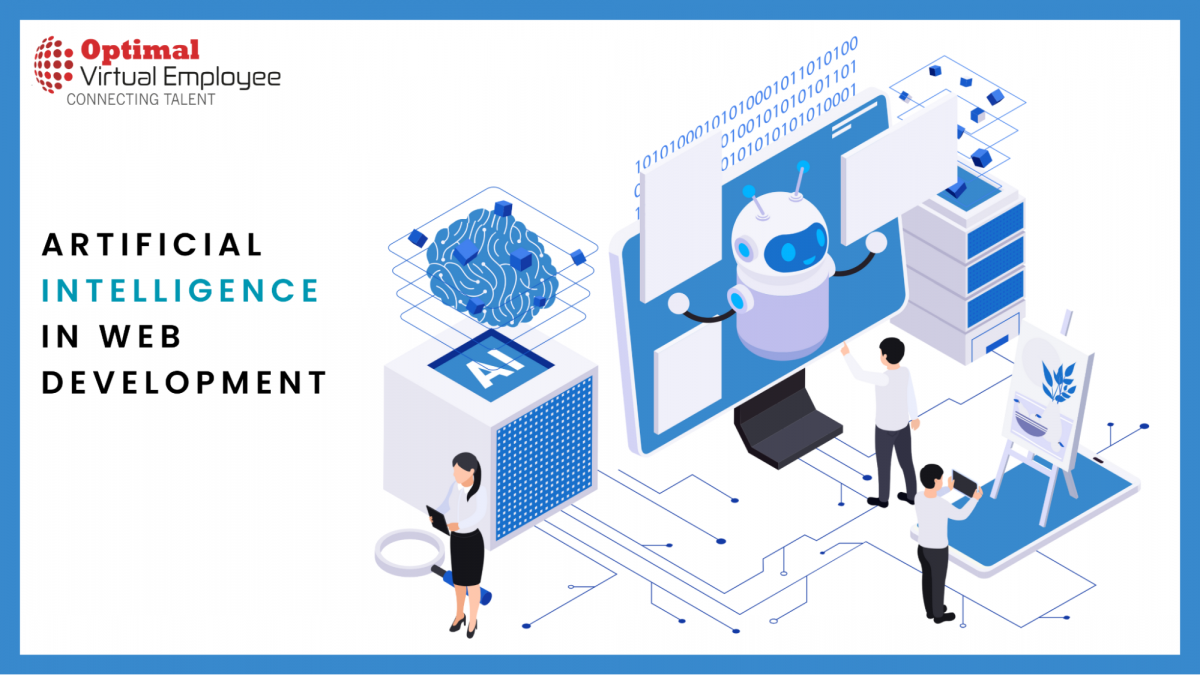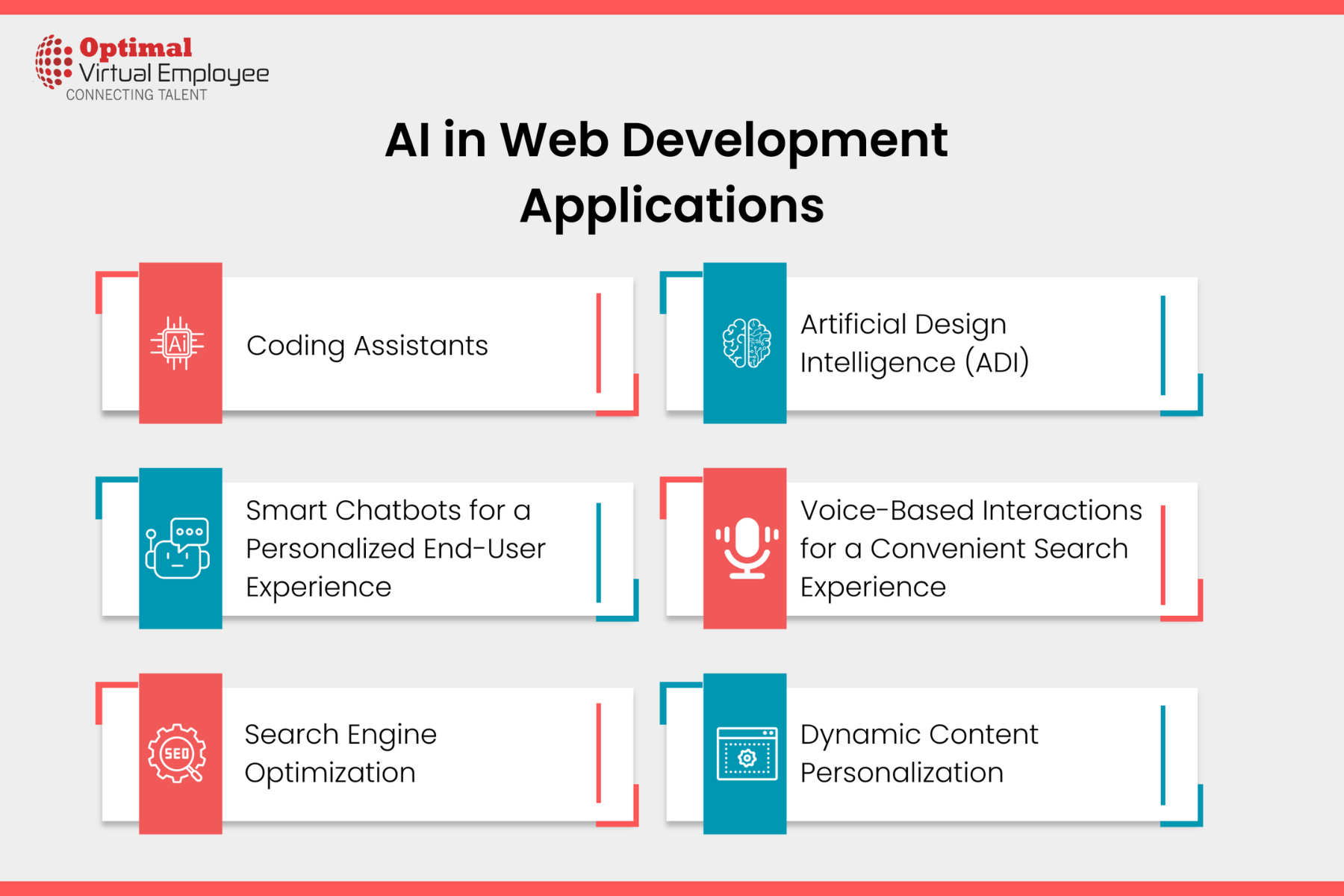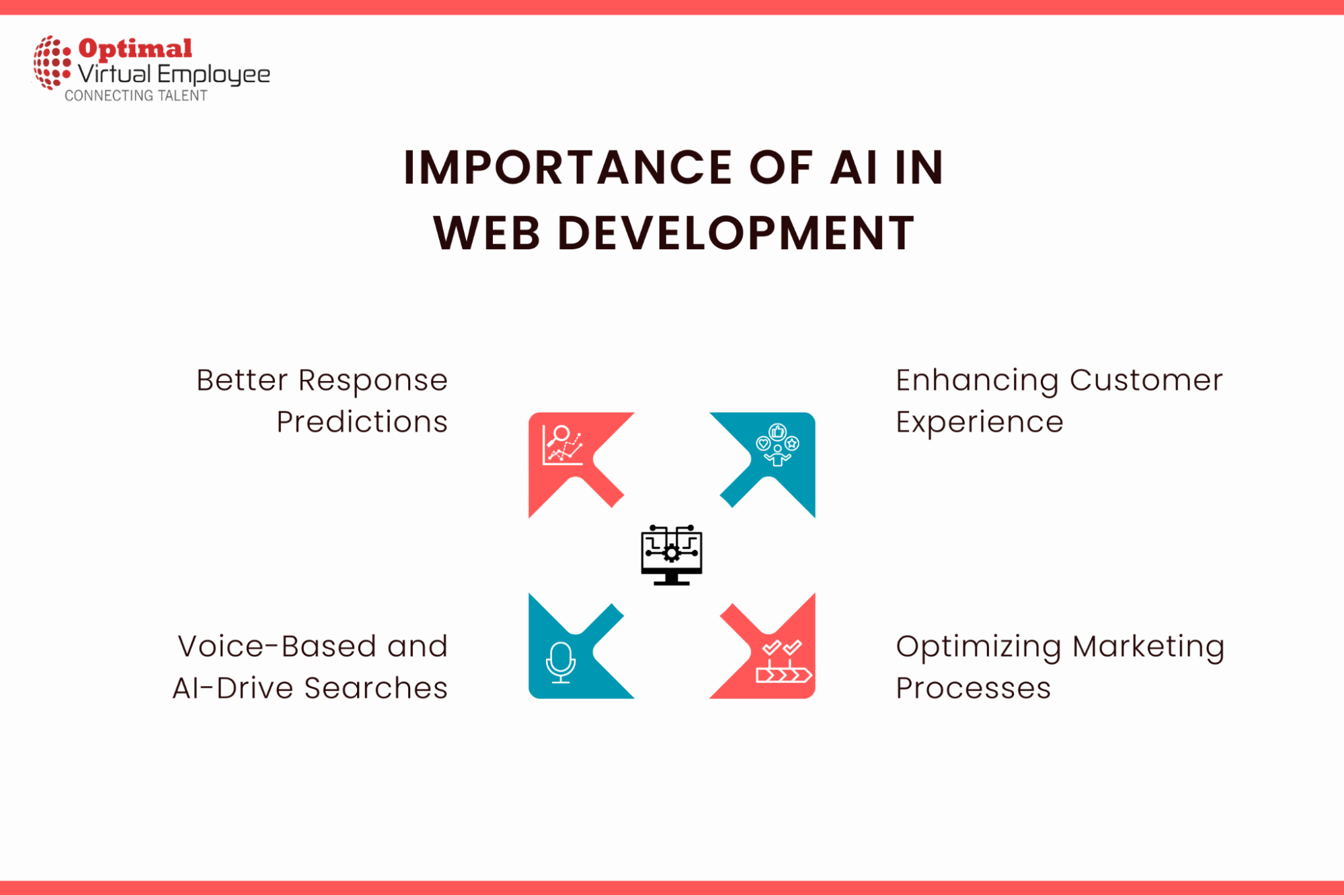Artificial intelligence (AI) has seamlessly woven itself into the fabric of the web development field, handling ever-more complicated responsibilities. However, its significance in the domain is often overlooked or under-discussed. If you aspire to make a mark in web development, it’s crucial to understand AI’s transformative impact.
To shed light on this subject, we’ve compiled the following guide. In it, we outline the top 7 ways AI is revolutionizing web development tasks, such as providing coding help, facilitating voice searches, automating testing, and more.
How Is AI Used In Web Development?
At present, the web development landscape is driven by a symbiotic relationship between artificial and human intelligence. While AI can’t solely manage the workload, humans are no longer required to work in isolation either. The majority of AI applications in this field enhance human developers’ efforts, making the development process more streamlined and efficient.
Ways AI Is Used in Web Development?
From crafting code to enhancing user interaction, AI has found numerous applications in the field of web development. Here’s a glimpse into how:
Coding Assistants
These programs assist seasoned developers in generating more code while minimizing manual typing. While software engineering is fundamentally a creative endeavor that demands intricate reasoning and a deep understanding of the project, it often includes the assembly of small, straightforward, and frequently used elements that function like building blocks.
Tools like Codex or GitHub’s Copilot offer valuable assistance to developers by suggesting subsequent lines of code or piecing together small code snippets. Nonetheless, their capabilities are mostly confined to brief, straightforward tasks, and their precision leaves something to be desired. For instance, OpenAI states that Codex has only a 37% likelihood of generating completely accurate code.
Despite these limitations, such tools can still speed up the coding process by providing sufficiently accurate suggestions. It’s important to note, however, that human developers must possess the expertise to quickly identify and correct any errors for these coding assistants to be genuinely effective.
Artificial Design Intelligence (ADI)
An ADI (Artificial Design Intelligence) can build fully functional e-commerce websites from scratch, encompassing elements like visual design, structure, and content. It tailors the site based on a few user queries and the wealth of data it has been trained on, ensuring a custom fit for any purpose or aesthetic preference.
Wix introduced its ADI technology as far back as 2016, leveraging insights from over 86 million users to train the system. This technology can create distinct websites from a virtually endless array of combinations, guaranteeing that users receive a site tailored to their functional needs and stylistic tastes. Users can further personalize these AI-constructed sites, modifying themes and adding text and images to bring their projects to full completion. Wix ADI offers the flexibility to either produce an entire website autonomously or guide users through the building process.
Smart Chatbots for a Personalized End-User Experience
Employing an AI-driven chatbot enables users to quickly access the information they seek without manually browsing for it. By posing questions in natural language, users can receive immediate responses and relevant links from the chatbot, which is programmed to sift through existing site content and tailor its answers.
Intercom offers AI-enabled chatbots that seamlessly integrate into websites, applications, or other software solutions. While these bots can’t handle every type of inquiry, they serve as an initial touchpoint, answering straightforward questions and freeing up human staff to focus on more complex issues.
Voice-Based Interactions for a Convenient Search Experience
Navigating through pages of text can be time-consuming, and scouring paragraphs for a specific sentence is less efficient than receiving the information audibly. Voice search offers just that: users verbally ask a question, and AI optimized for voice recognition identifies and vocalizes the relevant information.
Much like intelligent chatbots, voice-activated searches offer a more expedient and user-friendly way to acquire information.
Voice assistants like Siri can accomplish a range of tasks via spoken commands, and they’re compatible with multiple devices over various distances. Google Assistant offers similar functionalities. Among the tasks they can perform are:
– Sending text messages
– Fetching information from the web
– Managing smart home devices
– Utilizing phone capabilities such as reminders, alarms, and timers
– Searching for and playing tunes
– Language Translation
Search Engine Optimization (SEO) Made Easier
The task of search engine optimization can be labor-intensive, involving deep dives into keyword research, content topics, and effective phrasing. SEO AI tools can simplify this by offering top-ranking headlines and themes, along with the essential keywords to elevate your content’s ranking.
Some advanced SEO AI platforms can even draft segments of text, generating introductions with the ideal keyword frequency to curry favor with Google’s algorithms.
SEO.ai is an SEO software that streamlines the process of creating high-impact content. It offers headline suggestions or evaluates user-provided ones, recommends keywords, and conducts competitor analysis to identify content deficiencies. Additionally, it assigns an overall performance score to your content, giving insights into its likely Google ranking and suggestions for improvement.
Dynamic Content Personalization
Businesses must maintain ongoing engagement with their customers to encourage repeat business. However, generic messages and emails often fail to capture attention. What consumers crave is communication that feels personalized and relevant, as it shows that a brand understands their needs.
By leveraging AI-driven dynamic content personalization, it’s feasible to offer bespoke experiences to hundreds of thousands of customers. Using data aggregated from multiple sources, AI can assess a consumer’s stage in the customer journey, understand their behaviors, and develop tailor-made marketing strategies that resonate with them.
Braze serves as a customer engagement platform, enabling brands to foster customer-focused interactions that sustain audience interest. Utilizing AI and derived data, Braze ensures brands connect with their customers precisely when needed, offering messages that are both accurate and pertinent to each individual’s current phase in the customer journey.
Why it is Important to Use Artificial Intelligence in Web Development?
Thus, it’s evident that AI offers significant advantages in web development. But the question remains: How can you effectively integrate AI into your web development practices? Moreover, where and why should you employ AI in this context? Read on for some valuable insights.
Consider utilizing AI in web development when:
When Better Response Predictions are Required for Chatbots
AI-powered chatbots not only help in boosting sales but also improve the quality of automated replies. Continuously learning from human interactions, these chatbots are adept at predicting responses based on actual human behavior and previous queries.
When Enhancing Customer Experience is Essential
Websites employing AI are more proficient at discerning customer needs, offering a personalized user experience that is highly sought after. In today’s market, the focus is on making digital platforms as user-centric as possible, as the correct approach to user needs can significantly elevate a business’s revenue.
When Voice-Based and AI-Driven Searches are in Demand
Fed up with manual typing? Voice search is now a convenient option, facilitated by AI. Popular platforms like Siri, Alexa, Google Home, and Cortana offer robust voice-command capabilities.
When Optimizing Marketing Processes is Crucial
Marketing remains pivotal in understanding your customer base. It can provide insights into:
What are customers likely to purchase now and in the future?
Which products are less appealing to customers?
Which devices are customers using to access your site?
When is the peak time for customer activity on your website?
And there are even more questions of this nature that could prove extremely beneficial.
When Design Improvements are Necessary
Leveraging AI technologies allows website operators to deliver a one-of-a-kind experience to each visitor. This fosters a sense of value and appreciation among customers, boosting their trust in both the website and the business as a whole. Users are increasingly seeking personalized and customized interactions. The more user-friendly the website, the more successful it’s likely to be.
Conclusion
If you were to inquire about the role of AI in web development, the response would be unequivocal: AI is integral to the future of this field. The fusion of artificial intelligence with web development is more than just a technological fad; it’s a transformative shift that enhances business operations and ushers them into a new era of automation. Given its capabilities to optimize everything from user experience to backend processes, AI has become a cornerstone in contemporary web development, setting new standards for efficiency and innovation.
It’s increasingly difficult, if not redundant, to separate AI from web development in discussions about the industry’s future. Artificial intelligence is not just an adjunct or a novel feature; it is deeply embedded in the fabric of web development services. Whether it’s automating mundane tasks, personalizing user experiences, or aiding in complex problem-solving, AI contributes meaningfully across the spectrum. Hence, it would be remiss to consider web development and AI as independent entities; they are, in fact, symbiotic components advancing together to redefine the digital landscape.











